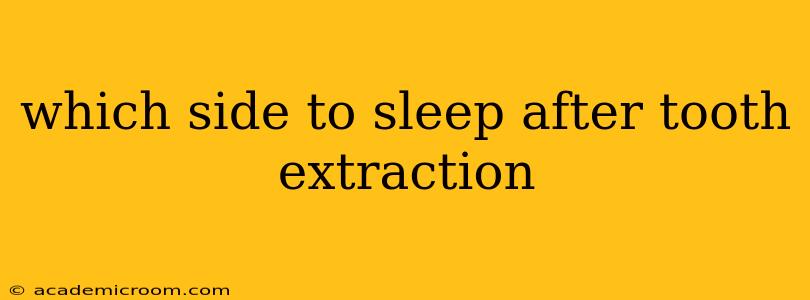Which Side to Sleep On After Tooth Extraction? A Comprehensive Guide
Getting a tooth pulled is never fun, but recovering comfortably is key to a speedy healing process. One of the most common questions patients have is: which side should I sleep on after a tooth extraction? The simple answer is: the side opposite the extraction.
This seemingly straightforward advice stems from several important factors that contribute to minimizing post-operative discomfort and complications. Let's delve deeper into the "why" behind this recommendation and address some common concerns.
Why Sleep on the Opposite Side After a Tooth Extraction?
Sleeping on the side opposite your extraction site helps in several crucial ways:
-
Reduces Bleeding and Swelling: Lying on the extraction site puts pressure on the wound, potentially dislodging the blood clot that forms and is essential for healing. This can lead to increased bleeding, pain, and a condition called "dry socket," which is extremely painful. Sleeping on the opposite side minimizes pressure and promotes clot formation.
-
Minimizes Discomfort: The pressure from lying on the extraction site can cause significant discomfort and throbbing pain. Sleeping on the unaffected side allows the area to rest and heal without added pressure or irritation.
-
Promotes Proper Healing: By reducing bleeding and discomfort, you allow the body to focus its energy on healing the extraction site without interference. This ultimately leads to faster recovery and reduced complications.
How to Sleep Comfortably on Your Side After a Tooth Extraction?
While sleeping on the opposite side is highly recommended, it's not always easy. Here are some tips for comfortable side sleeping:
-
Use Extra Pillows: Prop yourself up with extra pillows to elevate your head and reduce swelling. This also helps with drainage.
-
Sleep on Your Back (with caution): While side sleeping is generally preferred, if you find it too uncomfortable, consider sleeping on your back with your head slightly elevated. This minimizes pressure on the extraction site but might cause more swelling.
-
Use a Neck Roll: A neck roll can improve posture and neck support, preventing strain and discomfort.
-
Avoid Turning Onto the Extraction Site: Be mindful of your sleep position and try to avoid turning onto the affected side, especially during the first few days after surgery.
What if I Accidentally Sleep on the Extraction Site?
Don't panic if you accidentally sleep on the extraction site. While it's not ideal, it's unlikely to cause serious problems if it only happens once or twice. However, if you experience increased pain, bleeding, or other complications, contact your dentist immediately.
How Long Should I Sleep on the Opposite Side After a Tooth Extraction?
The duration you need to sleep on your opposite side depends on your individual healing process and the complexity of the extraction. Generally, it's advisable to follow this guideline for at least the first few days after surgery, or as recommended by your dentist or oral surgeon. Once the initial swelling subsides and the pain reduces, you can gradually resume your normal sleeping position.
What are the Signs of a Dry Socket?
A dry socket, or alveolar osteitis, is a painful complication that can occur after tooth extraction. It's characterized by:
- Severe pain that starts 2-3 days after extraction.
- A visible empty socket.
- A foul odor or taste.
If you suspect you have a dry socket, contact your dentist immediately for treatment.
Can I Use a Mouthwash After Tooth Extraction?
Yes, your dentist might recommend using a saltwater rinse or a prescribed antiseptic mouthwash to help keep the extraction site clean and prevent infection. Always follow your dentist's instructions carefully. Avoid vigorous rinsing, as this could dislodge the blood clot.
By following these guidelines and paying attention to your body's signals, you can ensure a comfortable and speedy recovery after your tooth extraction. Remember to always consult your dentist or oral surgeon with any questions or concerns you may have. They can provide personalized advice based on your individual circumstances.
